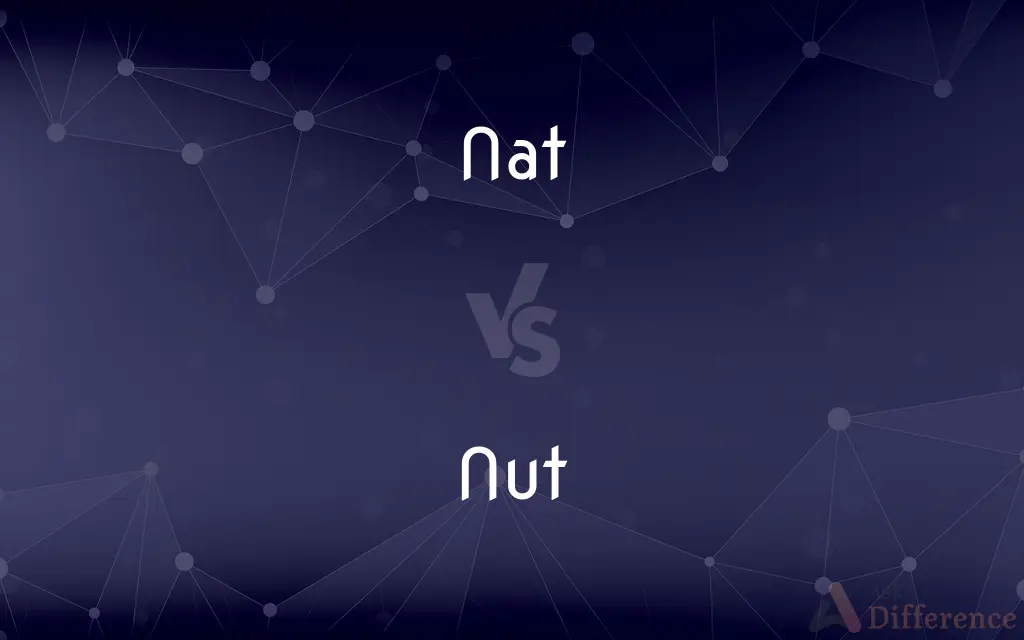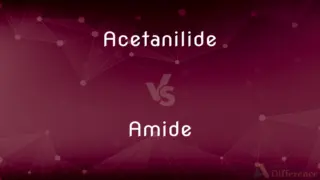Nat vs. Nut — What's the Difference?
By Tayyaba Rehman & Maham Liaqat — Updated on March 30, 2024
A nat is a spirit or supernatural being in Burmese mythology, whereas a nut is a hard-shelled fruit of some plants, often edible.

Difference Between Nat and Nut
Table of Contents
ADVERTISEMENT
Key Differences
In Burmese culture, nats are considered spiritual beings, often worshipped and revered, believed to influence the lives of the living. They are a central part of Burmese folklore and religious practices, with specific nats associated with different aspects of life and nature. On the other hand, nuts are a type of fruit characterized by a hard outer shell and a seed inside, which is generally edible. They are significant in various cuisines globally and are valued for their nutritional content, including healthy fats, proteins, and vitamins.
While nats are entities of worship and cultural significance in Myanmar, playing a role in both Buddhism and animist practices, nuts are cultivated and harvested for consumption. The reverence for nats involves rituals, offerings, and festivals, which are integral to Burmese spiritual life. In contrast, nuts are involved in agricultural practices, dietary habits, and food production, with no inherent spiritual significance.
The concept of nats encompasses a wide range of spirits, from those of historical figures to guardian spirits of places. These spirits are often thought to possess powers that can impact health, wealth, and fortune. Conversely, nuts include a variety of plant seeds such as almonds, walnuts, and cashews, each with its own specific nutritional profile and uses in cooking and baking.
Nats are integral to the unique cultural and religious identity of Myanmar, reflecting the country's rich spiritual traditions and beliefs. They are celebrated through festivals like the Taungbyon Festival, which attracts thousands of pilgrims annually. Nuts, while culturally significant in terms of food and agriculture, are a global commodity, traded internationally and incorporated into countless dietary traditions around the world.
The belief in nats can influence personal and community decisions, with many people consulting nat mediums for guidance. This spiritual practice contrasts with the cultivation and consumption of nuts, which are subject to agricultural, economic, and dietary considerations, showing how cultural beliefs can shape practices that are unrelated to physical sustenance.
ADVERTISEMENT
Comparison Chart
Nature
Spiritual being or supernatural entity in Burmese mythology.
Hard-shelled fruit of certain plants, often edible.
Cultural Significance
Integral to Burmese folklore and religious practices.
Valued for nutritional content in global cuisines.
Role
Influences life and nature, subject of worship.
Consumed for dietary benefits, used in cooking.
Types
Includes historical figures and guardian spirits.
Includes almonds, walnuts, cashews, etc.
Practices
Worshipped through rituals, offerings, and festivals.
Cultivated, harvested, and processed for consumption.
Compare with Definitions
Nat
Entities considered guardians of specific places or things.
According to legend, every river in Myanmar has its own nat.
Nut
A fruit with a hard shell and edible seed inside.
She cracked open a walnut, one of her favorite types of nuts.
Nat
Supernatural beings worshiped in Myanmar.
She offered flowers and food to the nats as a sign of respect.
Nut
Cultivated for consumption and used in various dishes.
He sprinkled chopped nuts over the dessert for extra crunch.
Nat
A spirit believed to influence the living in Burmese mythology.
The village held a ceremony to honor the local nat.
Nut
An essential component of diets worldwide due to their nutrients.
Adding nuts to your diet can improve heart health.
Nat
Integral to the spiritual and cultural fabric of Myanmar.
Nats are depicted in Burmese art and literature, symbolizing their importance.
Nut
Traded globally as a valuable agricultural product.
Brazil nuts are harvested in the Amazon and exported worldwide.
Nat
The subject of festivals and rituals in Burmese culture.
The Taungbyon Festival celebrates the brother nats with music and dance.
Nut
Found in both sweet and savory recipes.
Cashews are used in vegan recipes to create creamy textures.
Nat
A person who advocates political independence for a particular country
Winning the seat in central Scotland would give the Nats a massive psychological boost
Nut
An indehiscent fruit having a single seed enclosed in a hard shell, such as an acorn or hazelnut.
Nat
A spirit in Burmese mythology, whose cult is followed alongside Buddhism.
Nut
The usually edible seed of such a fruit.
Nat
A logarithmic unit of information or entropy, based on natural logarithms.
Nut
Any of various other usually edible seeds enclosed in a hard covering such as a seed coat or the stone of a drupe, as in a pine nut, peanut, almond, or walnut.
Nat
(obsolete) Not.
Nut
A crazy or eccentric person.
Nat
Not.
Nut
An enthusiast; a buff
A movie nut.
Nat
Not at; nor at.
Nut
(Informal) A difficult endeavor or problem
Painting the closet was a tough nut to crack.
Nut
(Slang) The human head.
Nut
A ridge of wood at the top of the fingerboard or neck of a stringed instrument, over which the strings pass.
Nut
A device at the lower end of the bow for a stringed instrument, used for tightening the hairs.
Nut
A small block of metal or wood with a central, threaded hole that is designed to fit around and secure a bolt or screw.
Nut
The cost of launching a business venture.
Nut
The operating expenses of a theater, theatrical production, or similar enterprise
"The [theater] has simply failed to attract enough paying customers per week to meet its nut" (Variety).
Nut
Vulgar Slang A testicle.
Nut
To gather or hunt for nuts.
Nut
Vulgar Slang To ejaculate.
Nut
Any of various hard-shelled seeds or hard, dry fruits from various families of plants.
There are many sorts of nuts: peanuts, cashews, pistachios, Brazil nuts and more.
Nut
Such a fruit that is indehiscent.
Nut
(hardware) A piece of hardware, typically metal and typically hexagonal or square in shape, with a hole through it having internal screw threads, intended to be screwed onto a threaded bolt or other threaded shaft.
Nut
(slang) The head. 19
Nut
(slang) A crazy person.
He was driving his car like a nut.
Nut
An extravagantly fashionable young man.
Nut
The glans structure at the extremity of the penis or of the clitoris.
Nut
A testicle.
I kicked him in the nuts.
Nut
Semen, ejaculate.
Nut
Orgasm, ejaculation; especially release of semen.
He just needs a good nut to make him feel better.
Nut
Monthly expense to keep a venture running.
Nut
The amount of money necessary to set up some venture; set-up costs.
Nut
A stash of money owned by an extremely rich investor, sufficient to sustain a high level of consumption if all other money is lost.
Nut
On stringed instruments such as guitars and violins, the small piece at the peghead end of the fingerboard that holds the strings at the proper spacing and, in most cases, the proper height.
Nut
En, a unit of measurement equal to half of the height of the type in use.
Nut
(climbing) A shaped piece of metal, threaded by a wire loop, which is jammed in a crack in the rockface and used to protect a climb. (Originally, machine nuts [sense #2] were used for this purpose.)
Nut
The best possible hand of a certain type, for instance: nut straight, nut flush, and nut full house. Compare t=the best possible hand available.
Nut
(nautical) A projection on each side of the shank of an anchor, to secure the stock in place.
Nut
(archaic) A small rounded cake or cookie.
Nut
(mostly in the form "nutting") To gather nuts.
Nut
To hit deliberately with the head; to headbutt.
Nut
To orgasm; to ejaculate.
Nut
(slang) To hit in the testicles.
Nut
(slang) To defeat thoroughly.
Nut
No.
Nut
The fruit of certain trees and shrubs (as of the almond, walnut, hickory, beech, filbert, etc.), consisting of a hard and indehiscent shell inclosing a kernel.
Nut
A perforated block (usually a small piece of metal), provided with an internal or female screw thread, used on a bolt, or screw, for tightening or holding something, or for transmitting motion. See Illust. of 1st Bolt.
Nut
A projection on each side of the shank of an anchor, to secure the stock in place.
Nut
Testicles.
Nut
To gather nuts.
Nut
Usually large hard-shelled seed
Nut
Egyptian goddess of the sky
Nut
A small (usually square or hexagonal) metal block with internal screw thread to be fitted onto a bolt
Nut
Half the width of an em
Nut
A whimsically eccentric person
Nut
Someone who is so ardently devoted to something that it resembles an addiction;
A golf addict
A car nut
A news junkie
Nut
One of the two male reproductive glands that produce spermatozoa and secrete androgens;
She kicked him in the balls and got away
Nut
Gather nuts
Common Curiosities
Are all nuts edible?
While many nuts are edible and nutritious, some require processing to remove toxins, and others may not be suitable for consumption.
How do nats influence Burmese culture?
Nats are deeply embedded in Burmese culture, influencing it through rituals, festivals, and the belief in their power over fortune and nature.
What is a nut?
A nut is a type of fruit with a hard outer shell and an edible seed inside, valued for its nutritional content.
What is a nat?
A nat is a spirit or supernatural being in Burmese mythology, often worshipped and considered influential in daily life.
What types of nuts are most commonly consumed?
Commonly consumed nuts include almonds, walnuts, cashews, and peanuts (technically a legume but often categorized with nuts).
Can nut allergies be severe?
Yes, nut allergies can be severe and even life-threatening, requiring individuals to avoid nuts and products containing nuts.
Can nats be related to specific places or objects?
Yes, some nats are believed to be guardians of specific places, objects, or elements in nature, protecting or influencing them.
What nutritional benefits do nuts offer?
Nuts are high in healthy fats, proteins, vitamins, and minerals, contributing to heart health, weight management, and reduced risk of chronic diseases.
Are there special festivals for nats in Myanmar?
Yes, there are special festivals such as the Taungbyon Festival dedicated to worshipping nats, attracting thousands of pilgrims.
What's the difference between nuts and seeds?
Nuts are a type of seed, but not all seeds are nuts; nuts are typically encased in a hard shell, while seeds can come in various forms.
Do beliefs in nats affect everyday decisions in Myanmar?
Yes, beliefs in nats can influence decisions and practices in daily life, including business, health, and personal matters.
How are nats worshipped?
Nats are worshipped through offerings, ceremonies, and festivals, where devotees may ask for blessings or guidance.
How are nuts used in cooking?
Nuts are versatile in cooking and baking, used for adding texture, flavor, and nutritional value to dishes.
How has the role of nats evolved in modern Myanmar?
While traditional beliefs in nats continue, their role has also adapted to contemporary life, merging with modern religious and cultural practices.
Is the worship of nats unique to Myanmar?
While similar beliefs exist in other cultures, the worship of nats in its specific form and practices is unique to Myanmar.
Share Your Discovery

Previous Comparison
Acetanilide vs. Amide
Next Comparison
Synonym vs. SynonymousAuthor Spotlight
Written by
Tayyaba RehmanTayyaba Rehman is a distinguished writer, currently serving as a primary contributor to askdifference.com. As a researcher in semantics and etymology, Tayyaba's passion for the complexity of languages and their distinctions has found a perfect home on the platform. Tayyaba delves into the intricacies of language, distinguishing between commonly confused words and phrases, thereby providing clarity for readers worldwide.
Co-written by
Maham Liaqat













































